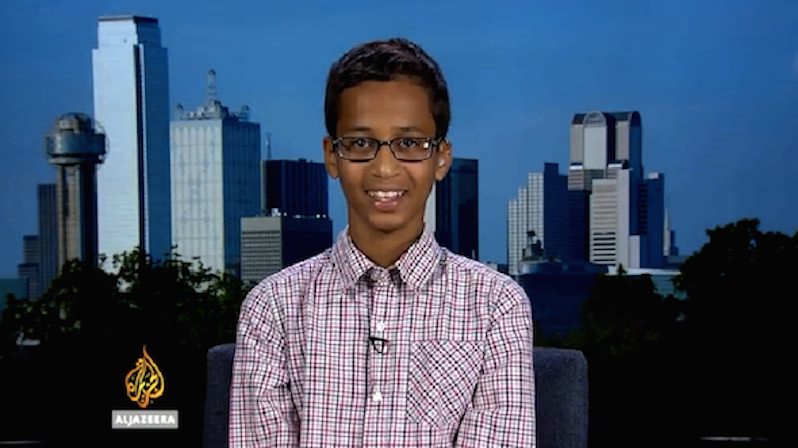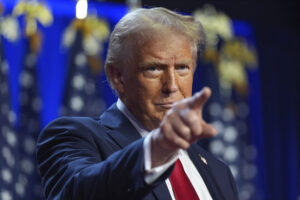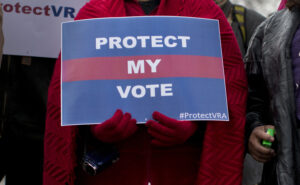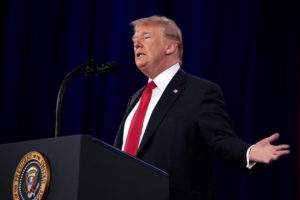Standing With Ahmed and All Children of Color
The treatment the 14-year-old science buff received from police and school authorities is emblematic of the obstacles children of color face—even when they have educational privilege. On Thursday, 14-year-old Ahmed Mohamed discussed his ordeal in a televised interview. (Al-Jazeera)
On Thursday, 14-year-old Ahmed Mohamed discussed his ordeal in a televised interview. (Al-Jazeera)
Fourteen-year-old Ahmed Mohamed became an overnight sensation Monday when he was arrested at his high school in Irving, Texas, for making a clock that his teacher and several police officers thought was a “hoax bomb.”
The boy, whose father is from Sudan, took his homemade clock to school, and when his teacher decided it looked like a bomb, she called the police. The Dallas Morning News revealed that four police officers interrogated Ahmed, made him feel self-conscious about his name and skin color, threatened him with expulsion from school and accused him of making a bomb, despite his repeated assertions that it was only a clock.
At a press conference, Irving police Chief Larry Boyd tried to justify the arrest, saying that during his interrogation the teenager “would only say it was a clock, and was not forthcoming at that time about any other details.” But what more could Ahmed say about a device that was in fact only a clock? “Having no other information to go on, and taking into consideration the device’s suspicious appearance and the safety of the students and staff at MacArthur High School, the student was taken into custody for possession of a hoax bomb,” said Boyd. According to Ahmed, one of the police officers told him, “It looks like a movie bomb to me,” revealing just how sophisticated the Irving Police Department’s methods are. Irving police seemingly applied what they know from movies to a real-life situation and put a child through an unnecessary, traumatizing and humiliating experience.
All charges against Ahmed have been dropped. But he was still suspended from MacArthur School for three days. The letter the school principal wrote to parents about the incident was tone-deaf, warning them to “talk with your child about the Student Code of Conduct and specifically not bringing items to school that are prohibited” instead of apologizing for terrorizing a student. Principal Daniel Cummings then urged parents to “remind your child how important it is to immediately report any suspicious items and/or suspicious behavior they observe to any school employee so we can address it right away.” In other words, the principal, in an attempt to vindicate his overreaction, wants people to continue to approach people and things with suspicion.
Ahmed’s father, Mohamed Elhassan Mohamed, did not mince words, saying clearly what he felt was true: “[B]ecause his name is Mohamed and because of Sept. 11, I think my son got mistreated.” The elder Mohamed is highly educated and is also an activist. He has even run for president of his native Sudan.
Right-wing rhetoric on Islam and Muslims has fed anti-Muslim sentiment over the years. The hysterical movement to ban Islamic law, or Sharia, in the U.S.—a movement that has spread to several states—is a blatant attempt at generating fear of Muslims. In fact, Irving Mayor Beth Van Duyne has engaged in such bigoted politicking, becoming famous for her vehement opposition to the nonexistent threat of “creeping Sharia law” in her town.
Undeterred by the attention Irving has received in the wake of Ahmed’s arrest, Van Duyne refused to apologize on behalf of the school and police and instead has absolved them of any wrongdoing. “I do not fault the school or the police for looking into what they saw as a potential threat,” she said. She went as far as to voice hopes that Ahmed’s false arrest wouldn’t deter police. “I hope this incident does not serve as a deterrent against our police and school personnel from maintaining the safety and security of our schools,” she wrote on her Facebook page.
Such rhetoric from politicians can and does fuel vigilante violence. A Sikh man in Illinois named Inderjit Singh Mukker was recently beaten in what is now being investigated as a hate crime. Although Mukker is not Muslim, his turban and beard probably led the perpetrator to think he was. In describing his attack, he said he was called “bin Laden” and told to “go back to his own country.” An FBI report earlier this year found that hate crimes against Muslims in the U.S. are still five times higher than pre-9/11 rates.
To his credit, President Barack Obama wasted no time in reaching out to Ahmed, tweeting “Cool clock, Ahmed. Want to bring it to the White House? We should inspire more kids like you to like science. It’s what makes America great.” While the statement stood in stark contrast to how poorly Republicans handled Ahmed’s case during Wednesday’s GOP debate, it also deflected from the president’s own culpability in fomenting anti-Muslim sentiment. Although Obama has never made anti-Muslim comments, under his administration the FBI has continued its unethical infiltration of Muslim communities—a policy begun by George W. Bush. The infiltration has not yielded serious intelligence on so-called “home-grown terrorism,” and, as Wayne State University history professor Abdullah Al-Arian writes, “The use of informants to target communities is one of the most alarming trends to have developed since 9/11, as it threatens to undo the fabric of a free society.”Earlier this year, Obama’s White House Summit on Countering Violent Extremism rubbed activists the wrong way with its almost exclusive focus on Muslim communities. A large number of prominent Islamic and civil rights organizations wrote a letter to the Department of Homeland Security saying they were concerned about “the targeting of American Muslim communities and communities presumed to be Muslim through activities conducted under the auspices of Countering Violent Extremism.” The Obama administration did not readjust the summit’s focus.
If Obama truly wants America to be great, as his tweet to Ahmed suggests, he can begin by making it a country that treats its Muslim citizens without suspicion.
Ahmed’s treatment is emblematic of the obstacles children of color face even when they have educational privilege. His immigrant background, his blackness (he is as black as Obama, having an African father and a white mother), and his Muslim name and faith have set him up for a lifetime of mistreatment by suspicious people.
Other children of color have received similar treatment. Two years ago, a 16-year-old African-American student in Florida named Kiera Wilmot was expelled from her school and faced felony charges after her science experiment created smoke and a “pop” sound. Because the incident took place during the week the Boston Marathon bombing was making all the headlines, the honor student’s criminalization did not receive nearly as much attention as Ahmed’s.
Contrast the stories of Ahmed and Kiera with a list that Gawker.com compiled of “7 Kids Not Named Mohamed” who made clocks and brought them to school without getting into trouble. One anonymous child even made an inert bomb with fertilizer and diesel but was not penalized.
We often criminalize, assault or even kill our children, especially those who are not white and wealthy. Twelve-year-old Tamir Rice was not given the benefit of the doubt by Cleveland police when he was shot dead for holding a toy gun. Dajerria Becton, 15, was violently roughed up by police in McKinney, Texas, at a pool party. Students of color in general are more likely to face arrest and juvenile detention than white students. A study in Los Angeles, for example, found that in 2013, black students were six times more likely to be ticketed than white students.
The humiliation and trauma of being arrested in school can harm a child’s self-esteem and impact his or her entire life. In Ahmed’s case, it is possible that the large amount of positive attention he has received will undo some of that harm. But most kids of color who are treated harshly because of their race do not receive such notice, and this may affect their academic achievements and future prospects. A 2012 American Civil Liberties Union study of Massachusetts schools found that “students who are arrested at school are three times more likely to drop out than those who are not.”
The parents of children who are targeted are also deeply traumatized. Ahmed’s face and demeanor remind me of my own son, and I imagined how painful it must have been for the Mohamed family to know that their child was interrogated by four adult authority figures, and then handcuffed and booked, without their knowledge. Every parent knows that their most important responsibility is to protect their child from harm. Ahmed’s experience is likely to confirm their fears that their child will be judged by the color of his skin, the sound of his name or his religious faith.
The good news is that ordinary Americans seem outraged at Ahmed’s story. The viral #IStandWithAhmed campaign shows that when confronted with a blatant case of Islamophobia, people are ready to stand against it. The challenge now lies in changing government and school policies and policing practices to ensure that children of color are treated with dignity, respect and love.
Your support matters…Independent journalism is under threat and overshadowed by heavily funded mainstream media.
You can help level the playing field. Become a member.
Your tax-deductible contribution keeps us digging beneath the headlines to give you thought-provoking, investigative reporting and analysis that unearths what's really happening- without compromise.
Give today to support our courageous, independent journalists.








You need to be a supporter to comment.
There are currently no responses to this article.
Be the first to respond.